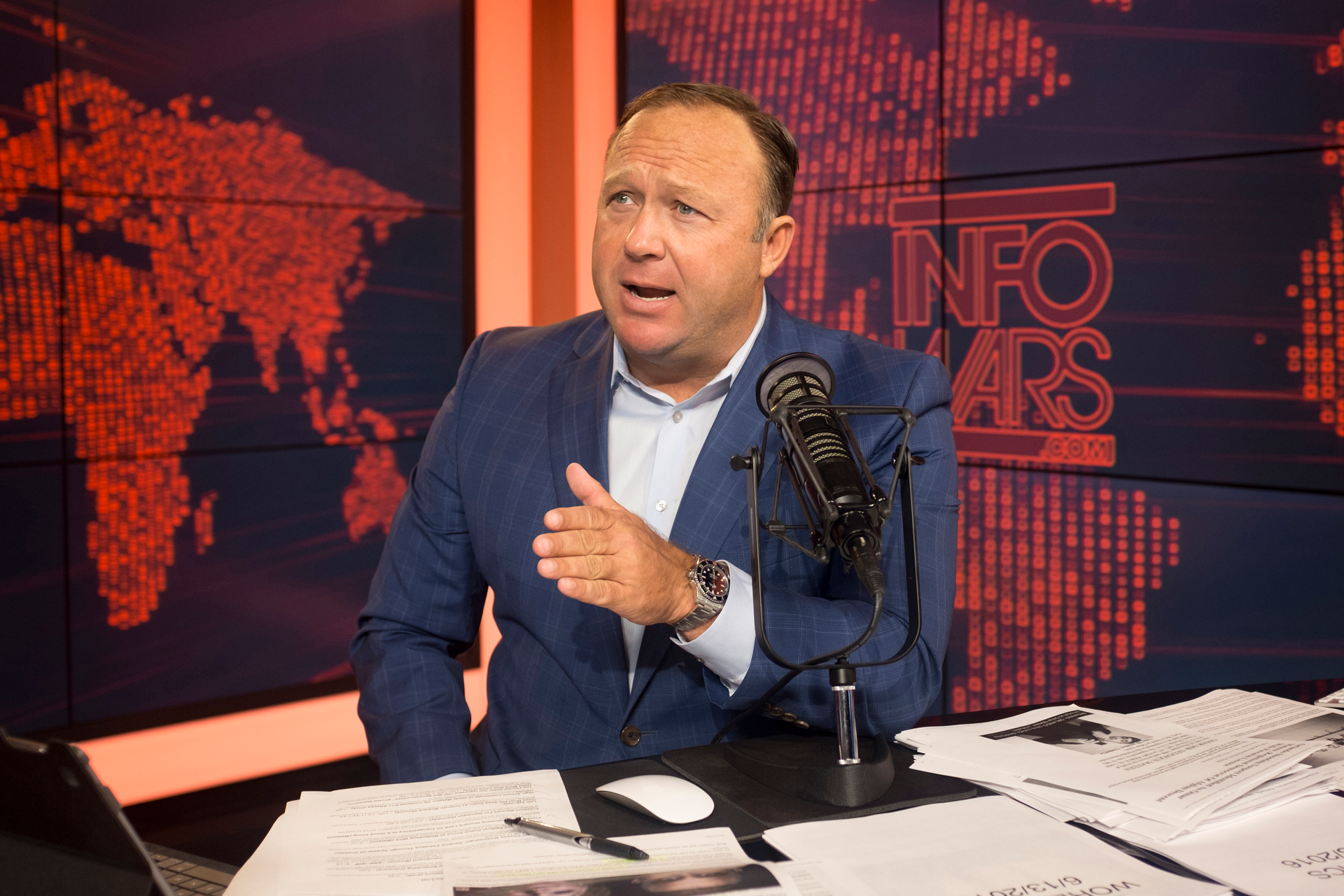The news that three tech giants — Apple, Facebook, and YouTube — had banned Alex Jones from their platforms Monday, Aug. 6, sent a shockwave through the digital ecosystem at large. The broader conversation quickly descended into splintered-up discussions about whether Jones is, in fact, a conspiracy theorist, and whether these companies are in the process of dousing fires they started themselves.
There’s no question that companies like Facebook, Google, Apple, and Twitter (Twitter, interestingly, has said that Jones does not violate its terms of service) have long delayed conducting themselves like the media giants that they are. The past couple of years have been a slow progression toward that standard — Facebook and Google are no different than Comcast and Fox. But the recent banning of Jones’s pages, and the reasons given for giving him the boot, speak to where we are in that progression.
It’s not irrational for brands to be apprehensive about where this type of regulation might be headed next, even if it’s a net positive to have one less prominent conspiracy theorist with a massive platform. For brands to feel comfortable in this territory again, the platforms themselves need to convince everyone that they’ve got things under control. Increasingly, there’s pressure for companies looking to advertise on social platforms to vet their partnerships.
Julia Gardner, founder and CEO of MAAST Digital, recently told me that brands are cautiously partnering with third-party providers to do their own due diligence — making sure their reach is legitimate, and understanding who they are actually advertising to. “Having good tools, set in place to do your own due diligence and not rely on Twitter to have these massive purges every quarter, is good,” she said. And while that’s certainly true, it’s no less incumbent on Facebook, Twitter, Google, and Apple to carry themselves with a sense of authority that puts advertisers at ease.
Related: Danger – Brand At Risk
As kooky as Jones may be, the events leading up to his cross-channel ban are a bit strange. He peddled conspiracy theories that the 2012 school shooting at Sandy Hook Elementary School was faked. He falsely claimed that Chobani’s Idaho yogurt factory was connected to a rise in tuberculosis cases. A denier of climate change, Jones falsely claimed that 2017’s Hurricane Irma, which decimated the Caribbean, was “geo-engineered.” There are more examples of his questionable dispersion of misinformation, none of which violated these tech companies’ guidelines severely enough to warrant punishment at the time. By not addressing the changing media climate in their explanations of the recent ban, it leaves room for speculation, conspiracy, and more mistrust.
In May 2018, signs emerged that tech companies were mounting a response to Jones’s enterprise — an enterprise made possible by entirely their platforms. YouTube reportedly reprimanded Jones for falsely claiming that student activists from Marjory Stoneman Douglas High School in Parkland, Fla. were crisis actors. Then, CNN made some advertisers public on Jones’s program, InfoWars. Advertisements by Nike, Acer, 20th Century Fox, Paramount Network, the Mormon Church, Moen, Expedia, Alibaba, HomeAway, Mozilla, the NRA, Honey, Wix, and ClassPass all reportedly appeared on Jones’s program.
A Nike spokesperson told CNN at the time that the company was “disturbed” to learn that its ads appeared on Jones’s channel. Paramount offered this: “We have a filter and brand safety assurances from Google our content would never run around offensive content.”
The move to ban Jones’s programs was justified by different companies for different reasons, and is somewhat inconsistent across channels. For example, Apple and Google have pulled Jones’s podcasts, but the InfoWars app is still in the Apple App Store and Google Play store — adding fuel to the trolls insisting that this is part of a politically-correct, damage-control campaign by big tech, and muddying the waters about what the ulterior motives might actually be. Many have also pointed out how suspicious the bans look, all arriving within hours of one another on Monday.
Facebook vaguely explained that it unpublished four pages connected to Jones after receiving reports over the weekend.
Facebook said in a news release:
“As a result of reports we received, last week, we removed four videos on four Facebook Pages for violating our hate speech and bullying policies. These pages were the Alex Jones Channel Page, the Alex Jones Page, the InfoWars Page and the Infowars Nightly News Page. In addition, one of the admins of these Pages — Alex Jones — was placed in a 30-day block for his role in posting violating content to these Pages.”
YouTube followed, claiming that Jones tried to circumvent an earlier ban of his livestreams implemented in July.
In a string of brash tweets following the news that his content had been banned in various forms from Apple, Facebook, YouTube, and Spotify, Jones smeared the move as free-speech censorship by big tech.
“I told you this was coming,” Jones said in a heated Monday broadcast on Periscope. “They finally dropped the hammer.” He also tweeted a photo of a plaque celebrating his subscriber count, apparently given to him by YouTube at some point during his rise to prominence.
Jones’s supporters will no doubt be outraged. His critics will be thrilled. Consumers of news will be relieved that there’s a little less misinformation to navigate. But companies looking to earn advertising dollars via these platforms might be left to wonder, if these governing guidelines (both those that have been made public, and those that circulate internally) can be fluid based on whatever seems favorable in the moment.
Can the Facebooks and Googles of the world ever fully regain advertisers’ trust?







